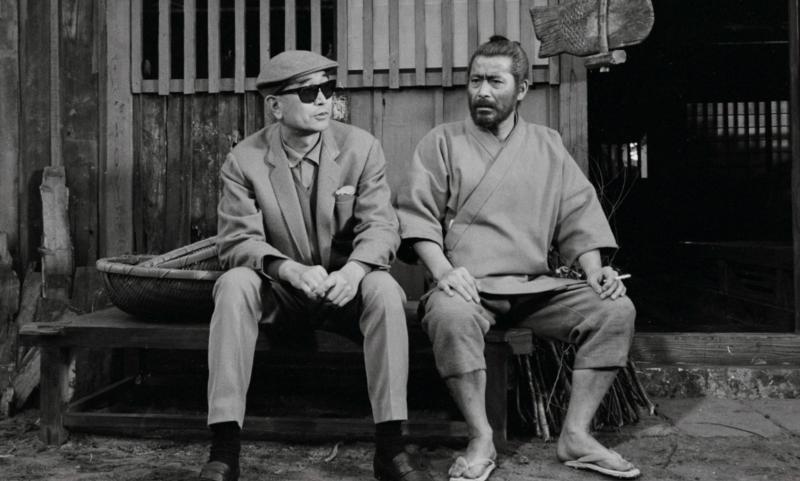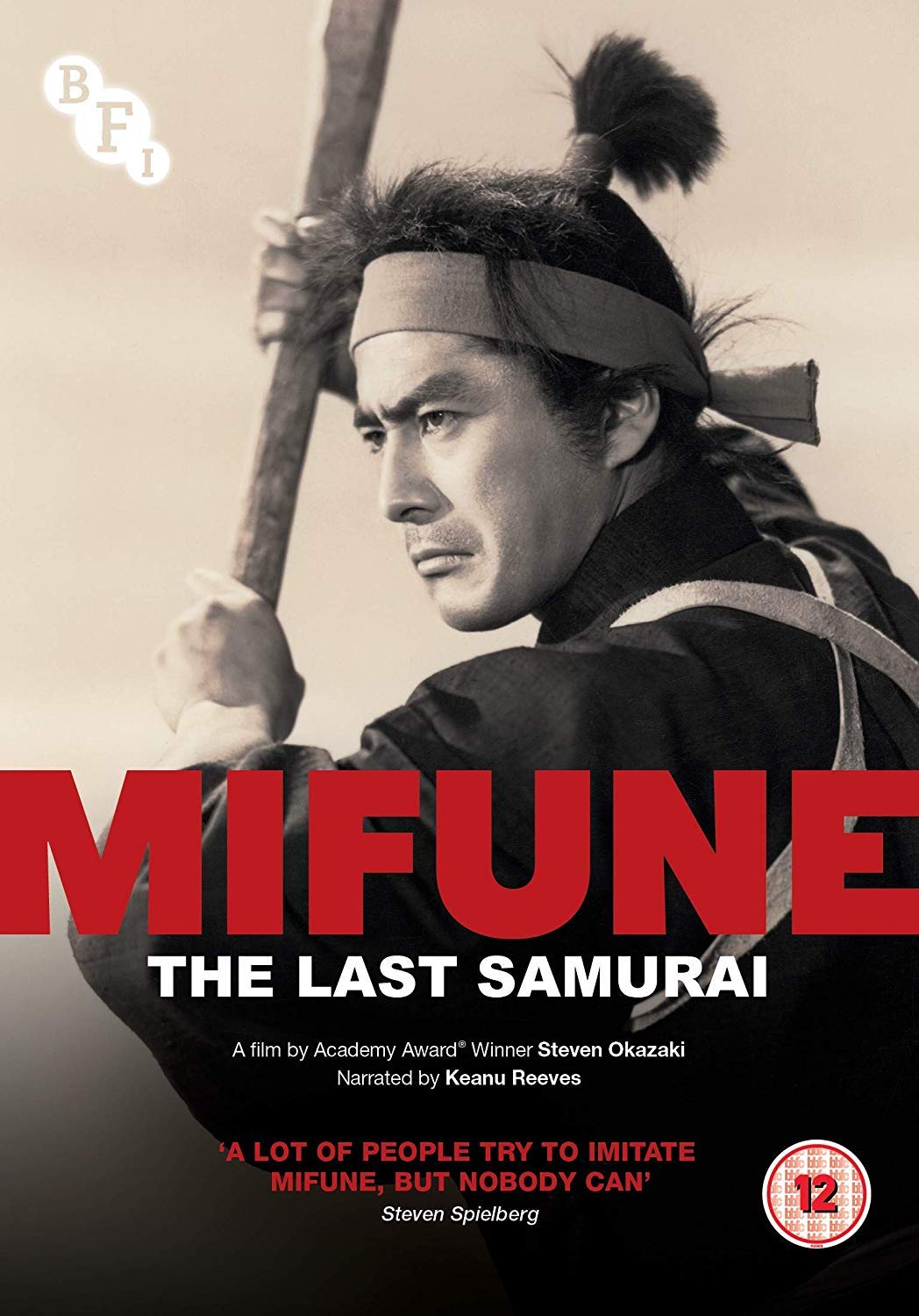DVD: Mifune - The Last Samurai | reviews, news & interviews
DVD: Mifune - The Last Samurai
DVD: Mifune - The Last Samurai
The life and times of the great Japanese actor Toshiro Mifune

Akira Kurosawa’s 1950 early masterpiece Rashomon was a revelation for post-war western screen audiences, winning the Golden Lion at the Venice Film Festival that year and becoming a standard-bearer for the new generation of Japanese film.
Steven Okazaki’s Mifune: The Last Samurai goes beyond the genre associations of its title to create a wider documentary study that is as much about the actor’s world – the context of Japanese cinema over the course of half a century, from Mifune’s first role in 1947 through to his death in 1997 – as it is a particular portrait of his subject: details of biography are subordinate to a more general context of the times. It starts with the cinematic environment into which a new generation of post-war directors emerged, and how they adapted traditional elements of Japanese culture for new times (occupying US forces banned sword-fighting films, the formulaic chanbara, for seven years after the end of the war).
 Mifune himself came to acting almost by chance, originally thinking that his wartime experience training pilots might qualify him for work as a cameraman, making his appearance at a Toho Studios “New Faces” talent competition almost accidental. It was there that his originality, his sheer intensity as an actor, was spotted by Kurosawa, and the 16 films they would make together over 18 years defined a new sort of hero. Okazaki assembles a fascinating range of interviews with some of their surviving collaborators, from the fight sequence trainer who remembers how he was killed on screen by Mifune more than 100 times, to Kurosawa’s script supervisor remembering the filming of the grandiose climactic scene to the director’s 1957 Macbeth adaptation Throne of Blood: the tension of Mifune’s death in a spectacular hail of arrows was made all the more anxious, she recalls, by the fact that it was being shot without accident insurance.
Mifune himself came to acting almost by chance, originally thinking that his wartime experience training pilots might qualify him for work as a cameraman, making his appearance at a Toho Studios “New Faces” talent competition almost accidental. It was there that his originality, his sheer intensity as an actor, was spotted by Kurosawa, and the 16 films they would make together over 18 years defined a new sort of hero. Okazaki assembles a fascinating range of interviews with some of their surviving collaborators, from the fight sequence trainer who remembers how he was killed on screen by Mifune more than 100 times, to Kurosawa’s script supervisor remembering the filming of the grandiose climactic scene to the director’s 1957 Macbeth adaptation Throne of Blood: the tension of Mifune’s death in a spectacular hail of arrows was made all the more anxious, she recalls, by the fact that it was being shot without accident insurance.
Mifune acted extensively outside Japan too, and there are interviews with Martin Scorsese and Steven Spielberg; the latter worked with Mifune on his submarine comedy 1941 and recalls him as “a wild character from the earth, like he had been created by the forces of seismic activity from underground… very funny and violent”, as well as highlighting the influence that 1950s Japanese cinema had on a new generation of American directors, the tropes of the samurai hero finding new form in the western (Spielberg and his own generation would also become active supporters of late-career Kurosawa). Okazaki tackles the issue of Mifune’s separation from Kurosawa that followed their final film Red Beard in 1965 with sensitivity, speaking to the sons of both. It was more a parting of the ways than any disagreement as such, driven not least by the responsibilities that Mifune had assumed at his own studio. Kurosawa would recall fondly, in a letter read out at Mifune’s funeral, how the two had been “been part of the golden age of Japanese cinema together”. Let down only by a disengagingly monotone narration from Keanu Reeves, Mifune: The Last Samurai is a worthy broadbrush tribute that leaves you wanting to discover more, to return to these screen masterpieces.
rating
Share this article
The future of Arts Journalism
You can stop theartsdesk.com closing!
We urgently need financing to survive. Our fundraising drive has thus far raised £49,000 but we need to reach £100,000 or we will be forced to close. Please contribute here: https://gofund.me/c3f6033d
And if you can forward this information to anyone who might assist, we’d be grateful.

Subscribe to theartsdesk.com
Thank you for continuing to read our work on theartsdesk.com. For unlimited access to every article in its entirety, including our archive of more than 15,000 pieces, we're asking for £5 per month or £40 per year. We feel it's a very good deal, and hope you do too.
To take a subscription now simply click here.
And if you're looking for that extra gift for a friend or family member, why not treat them to a theartsdesk.com gift subscription?
more Film
 Eight Postcards from Utopia review - ads from the era when 1990s Romania embraced capitalism
Radu Jude's documentary is a mad montage of cheesy TV commercials
Eight Postcards from Utopia review - ads from the era when 1990s Romania embraced capitalism
Radu Jude's documentary is a mad montage of cheesy TV commercials
 The Kingdom review - coming of age as the body count rises
A teen belatedly bonds with her mysterious dad in an unflinching Corsican mob drama
The Kingdom review - coming of age as the body count rises
A teen belatedly bonds with her mysterious dad in an unflinching Corsican mob drama
 Weapons review - suffer the children
'Barbarian' follow-up hiply riffs on ancient fears
Weapons review - suffer the children
'Barbarian' follow-up hiply riffs on ancient fears
 theartsdesk Q&A: filmmaker Dag Johan Haugerud on sex, love, and confusion in the modern world
The writer-director discusses first-love agony and ecstasy in 'Dreams', the opening UK installment of his 'Oslo Stories' trilogy
theartsdesk Q&A: filmmaker Dag Johan Haugerud on sex, love, and confusion in the modern world
The writer-director discusses first-love agony and ecstasy in 'Dreams', the opening UK installment of his 'Oslo Stories' trilogy
 Oslo Stories Trilogy: Dreams review - love lessons
First love's bliss begins a utopian city symphony
Oslo Stories Trilogy: Dreams review - love lessons
First love's bliss begins a utopian city symphony
 Blu-ray: Two Way Stretch / Heavens Above!
'Peak Sellers': two gems from a great comic actor in his prime
Blu-ray: Two Way Stretch / Heavens Above!
'Peak Sellers': two gems from a great comic actor in his prime
 Late Shift review - life and death in an understaffed Swiss hospital
Petra Volpe directs Leonie Benesch in a compelling medical drama
Late Shift review - life and death in an understaffed Swiss hospital
Petra Volpe directs Leonie Benesch in a compelling medical drama
 The Naked Gun review - farce, slapstick and crass stupidity
Pamela Anderson and Liam Neeson put a retro spin on the Police Squad files
The Naked Gun review - farce, slapstick and crass stupidity
Pamela Anderson and Liam Neeson put a retro spin on the Police Squad files
 theartsdesk Q&A: actor Lars Eidinger on 'Dying' and loving the second half of life
The German star talks about playing the director's alter ego in a tormented family drama
theartsdesk Q&A: actor Lars Eidinger on 'Dying' and loving the second half of life
The German star talks about playing the director's alter ego in a tormented family drama
 The Fantastic Four: First Steps review - innocence regained
Marvel's original super-group return to fun, idealistic first principles
The Fantastic Four: First Steps review - innocence regained
Marvel's original super-group return to fun, idealistic first principles
 Dying review - they fuck you up, your mum and dad
Family dysfunction is at the heart of a quietly mesmerising German drama
Dying review - they fuck you up, your mum and dad
Family dysfunction is at the heart of a quietly mesmerising German drama
 theartsdesk Q&A: director Athina Rachel Tsangari on her brooding new film 'Harvest'
The Greek filmmaker talks about adapting Jim Crace's novel and putting the mercurial Caleb Landry Jones centre stage
theartsdesk Q&A: director Athina Rachel Tsangari on her brooding new film 'Harvest'
The Greek filmmaker talks about adapting Jim Crace's novel and putting the mercurial Caleb Landry Jones centre stage

Add comment